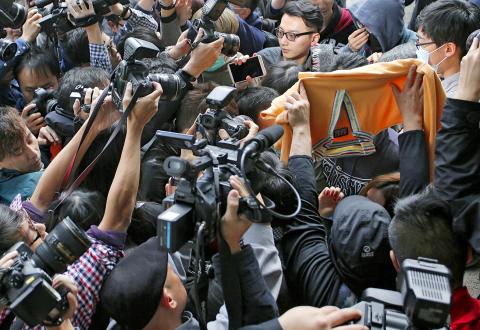Dozens of people in Hong Kong yesterday were charged with taking part in a riot after a dispute between vendors and police on the first day of the Lunar New Year holiday blew up into territory’s worst violence since pro-democracy protests in 2014.
Sixty-four people have been arrested in connection with the Monday night violence that saw protesters hurl bricks at police and set fire to trash cans in Mong Kok, a working-class neighborhood. Thirty-seven were charged yesterday.
More than 130 people were wounded in the clashes.

Photo: AP
The violence has compounded a sense of unease since an “Occupy Central” pro-democracy movement in late 2014 that saw thousands of protesters block major roads, including in Mong Kok, to demand Chinese Communist Party leaders allow full democracy in the territory.
At least one of those charged, Edward Leung Tin-kei (梁天琦), belongs to a group called Hong Kong Indigenous, one of a cluster of outspoken groups calling for greater Hong Kong autonomy and even independence from China.
Leung has been planning to contest a by-election for the Hong Kong Legislative Council.
The head of the University of Hong Kong student union, Billy Fung (馮敬恩), said three of its students were also in court. Students from the university were at the forefront of the 2014 protests.
Thirty-eight people — 35 men and three women aged between 15 and 70 — were charged with participating in a “riot,” the police said in a statement.
The 15-year-old is due to appear in a juvenile court today.
The defendants, who appeared one after another, including one with a bandage on his head, were granted bail and ordered to stay away from areas where the clashes took place. The next hearing will be on April 7, following a request by prosecutors to allow authorities time to gather evidence.

In his National Day Rally speech on Sunday, Singaporean Prime Minister Lawrence Wong (黃循財) quoted the Taiwanese song One Small Umbrella (一支小雨傘) to describe his nation’s situation. Wong’s use of such a song shows Singapore’s familiarity with Taiwan’s culture and is a perfect reflection of exchanges between the two nations, Representative to Singapore Tung Chen-yuan (童振源) said yesterday in a post on Facebook. Wong quoted the song, saying: “As the rain gets heavier, I will take care of you, and you,” in Mandarin, using it as a metaphor for Singaporeans coming together to face challenges. Other Singaporean politicians have also used Taiwanese songs

NORTHERN STRIKE: Taiwanese military personnel have been training ‘in strategic and tactical battle operations’ in Michigan, a former US diplomat said More than 500 Taiwanese troops participated in this year’s Northern Strike military exercise held at Lake Michigan by the US, a Pentagon-run news outlet reported yesterday. The Michigan National Guard-sponsored drill involved 7,500 military personnel from 36 nations and territories around the world, the Stars and Stripes said. This year’s edition of Northern Strike, which concluded on Sunday, simulated a war in the Indo-Pacific region in a departure from its traditional European focus, it said. The change indicated a greater shift in the US armed forces’ attention to a potential conflict in Asia, it added. Citing a briefing by a Michigan National Guard senior

CHIPMAKING INVESTMENT: J.W. Kuo told legislators that Department of Investment Review approval would be needed were Washington to seek a TSMC board seat Minister of Economic Affairs J.W. Kuo (郭智輝) yesterday said he received information about a possible US government investment in Taiwan Semiconductor Manufacturing Co (TSMC, 台積電) and an assessment of the possible effect on the firm requires further discussion. If the US were to invest in TSMC, the plan would need to be reviewed by the Department of Investment Review, Kuo told reporters ahead of a hearing of the legislature’s Economics Committee. Kuo’s remarks came after US Secretary of Commerce Howard Lutnick on Tuesday said that the US government is looking into the federal government taking equity stakes in computer chip manufacturers that

US President Donald Trump on Friday said that Chinese President Xi Jinping (習近平) told him China would not invade Taiwan while Trump is in office. Trump made the remarks in an interview with Fox News, ahead of talks with Russian President Vladimir Putin over Moscow’s invasion of Ukraine. “I will tell you, you know, you have a very similar thing with President Xi of China and Taiwan, but I don’t believe there’s any way it’s going to happen as long as I’m here. We’ll see,” Trump said during an interview on Fox News’ Special Report. “He told me: ‘I will never do